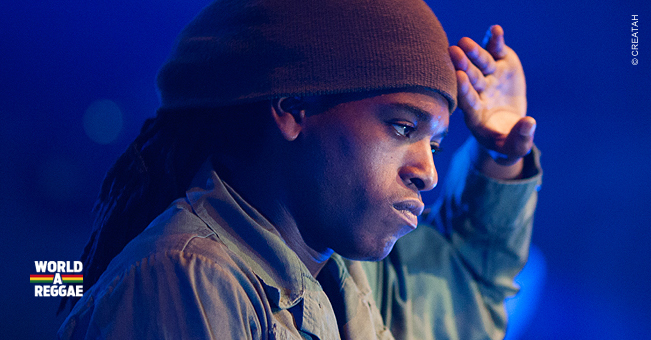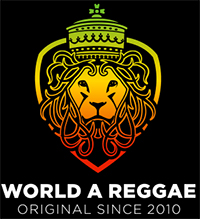Biography
One of the newest recruits to the Ghetto Youths International ranks, the culturally inclined reggae singjay Black Am I has already distinguished himself as a powerful voice of Jamaican music’s next generation. While he may be fresh to the music business, Black Am I has got ambition aplenty—and the talent and integrity to back it up. If you don’t know his name yet, then it’s time to get familiar.
In this time, when some of the most fundamental tenets of reggae culture seem to have fallen by the wayside, Black Am I replenishes the great traditions of self-determination, equal rights, and celebration of one’s African identity through hard-hitting yet conscious lyrics. Backed by fresh sounds that blend classical roots reggae with contemporary dancehall energy, the young artist is poised to spark a revolution in the minds and hearts of music lovers worldwide.
Born in the rural village of Nine Mile, situated in the hills of the Jamaican parish of St. Ann, Black Am I knew that he was blessed with the gift of music. “Growing up in Nine Mile reggae was a part of me,” Black Am I explains.
His father chose to call him I-Nesta, out of respect for Nine Mile’s most famous son, Robert Nesta Marley. Sometimes a name carries the seeds of destiny—in keeping with the Rastafarian concept of word, sound, and power—so it came as no surprise somehow when Black Am I was inspired to sing.
“Music we say,” Black Am I affirms. “I love the thing for a long time. I just want to see it reach to a level.”
But the level he’s aiming for isn’t just the usual “next level” cliché of searching for any form of success by any means necessary. Instead, Black Am I holds himself to a higher standard. “I feel like I’m responsible to bring back roots reggae,” the young singer says without hesitation. “Cause the thing get watered down.”
From an early age—long before he had access to a recording studio—Black Am I began writing his own songs. Right now all I need is a producer, he told himself. So when Damian “Junior Gong” Marley was visiting Nine Mile one day, he recognized the opportunity. “I approach him and say, ‘I am the artist in the place y’know,’” Black Am I recalls. Always willing and able to support fresh talent, Junior Gong asked him to sing something.
“The first time I met up with Black Am I in Nine Mile,” Junior Gong says with a smile, “I told him that he needed some more practice.” But Black Am was far from discouraged—quite the contrary. “I was never disappointed,” he says, “cause practice is perfection. So I just went for it.”
Rising to meet the challenge, Black Am I diligently put in the required work, and made sure he was ready the next time Junior Gong visited Nine Mile. The occasion happened to be a celebration of the Ethopian Christmas on the 7th of January. “Gong was in the place again, and a celebration was in the air,” Black Am I remembers. “After the gathering he was walking back to his father’s place. And I just started to sing.”
The memory remains fresh for Damian Marley. “He just came up beside me and started sing: If you don’t wanna be misled, I tell you Ras up and come. He did this whole tune and I said, Wait! Who’s this?” Something about the voice seemed familiar but he couldn’t quite place it. That’s when Black Am I reminded him. “You don’t remember me? The same one you meet a year ago—you told me to practice.” Impressed by the youth’s talent, Junior Gong invited him to a formal audition at Tuff Gong studios in Kingston.
“I did not even know Tuff Gong at that time,” recalls the singer, who was then still known as Nesta. “I came to Hope Road to the demo studio. Some tracks were playing and we voiced on them.”
That initial session would prove to be fateful for more reasons than one. The first song he recorded that day went like this: “Black am I, why should I stray? / Sticking to my roots and culture and so me ah go stay. / Black am I, like who must I say? / Martin Luther King and Marcus Garvey.” That powerful lyric had an immediate and lasting impact on all who heard it, and on the artist himself.
“People never knew my name at the time,” the artist recalls. “So everybody was calling me ‘Black Am I.’” Soon thereafter Junior Gong made it official, telling him “that’s the name we’re working with.”
Since that time, the artist formerly known as I-Nesta has come to appreciate the significance of his powerful new name, his consciousness expanding to fulfill the potential implied by the title. “Being Black Am I, now I just represent for ‘I and I’ roots and culture,” And we burn bleaching. We are African—there’s no denying that. So that is why we have to just accept our name and say: This is the job we’ve got to do. Nothing has changed. Rastafari come from the root—Africa. The Lion of Judah shall never break him promise.”
Junior Gong has invested significant time and effort on artist development, and has noticed a rapid evolution of the young singer. “When we start work with Black Am I, it was just really natural talent and love of music coming through,” he says. “Since that time, he’s started to get more calculated.”
“With Damian Marley I become a workaholic,” says the artist, who has put down tracks like “Dwelling”, “People Kill People” on King Jammy’s General Riddim and the thought-provoking “Modern Day Freedom,” which raises timely questions about life within a 21st century system of economic dependency.
More Info
VIDEO
http://www.youtube.com/watch?v=Z8wcGJZhGww


